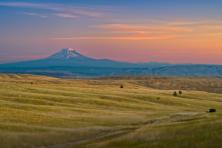Around the world, the heat is on—and not in a good way. The White House declared this week, May 23rd – 27th, Extreme Heat Week, to highlight the dangers of high temperatures, and the need for Americans to better prepare for dangerous heat and drought. In the Pacific Northwest, it may seem odd to be discussing extreme temperatures in the month of May. But even in our temperate region, it’s becoming apparent that we can no longer rely on Spring to be its mild, soggy self, swinging between sunshine and downpours, and making us all dress in practical layers.
Record Breaking Heat in the Northwest
Last month was the warmest April on record globally, marking the twelfth consecutive record-breaking month and putting 2016 on track to be the hottest year in history for the third year in a row. As of two weeks ago, Portland had already experienced twelve days over 80 degrees, the most ever recorded by that time of year. . We usually only have one day over 80 degrees by mid-May. Seattle also smashed multiple heat records last month, including the hottest day ever recorded in April (89°F on April 18th).
Heat waves are becoming increasingly intense and frequent around the world due to climate change, exacerbated this year by an unusually strong El Niño. A silent killer, extreme heat also causes major health impacts for vulnerable groups, especially the elderly, children, low-income communities and outdoor workers like farmers and construction workers. Heat-related illnesses and deaths are preventable, however, hence the White House’s efforts to enhance local preparedness around the country by partnering with community planners and public health officials.
India on the Frontlines of Climate Change
The deadly consequences of extreme heat are bearing down tragically on communities on the frontlines of the climate emergency. Heartbreaking news is coming from South Asia, where India’s highest-ever temperature of 51°C (123.8°F) was recorded last week and hundreds have died due to the severe heat. Last year, India suffered one of history's deadliest heat waves, which killed more than 2,300 people. The current heat wave is melting roads in the country. It is painful to imagine the impact that scorching heat has on the human body if it can literally melt tar pavement.
I spent the past few years working with dedicated local public health officials and international experts to craft climate preparedness plans for extreme heat and air pollution across India’s cities. Unlike in the U.S., many Indians cannot seek respite from the heat in comfortably air conditioned homes, offices, and cars. Not only are air conditioners – and even reliable electricity – considered a luxury item in many parts of India, the working poor and outdoor laborers often face the impossible choice between braving the unbearable temperatures and earning a day’s wages. In India, as elsewhere, vulnerable communities with the fewest resources are bearing the brunt of the impacts of climate-fueled weather extremes.
The Need for Bold Action
Tragedies like the ongoing heat wave in India and record-breaking temperatures around the world, including here in the Northwest, underscore the urgency for leadership to combat the growing severity of global warming. These events motivate me to push for the bold action needed here in the U.S. to mitigate the amount of greenhouse emissions spewing from our cars and energy grid, by accelerating our region’s transition to a clean energy, low-carbon economy. As the mercury spikes, we have a moral imperative to take meaningful climate action to better protect the health and well-being of people here and around the world.





